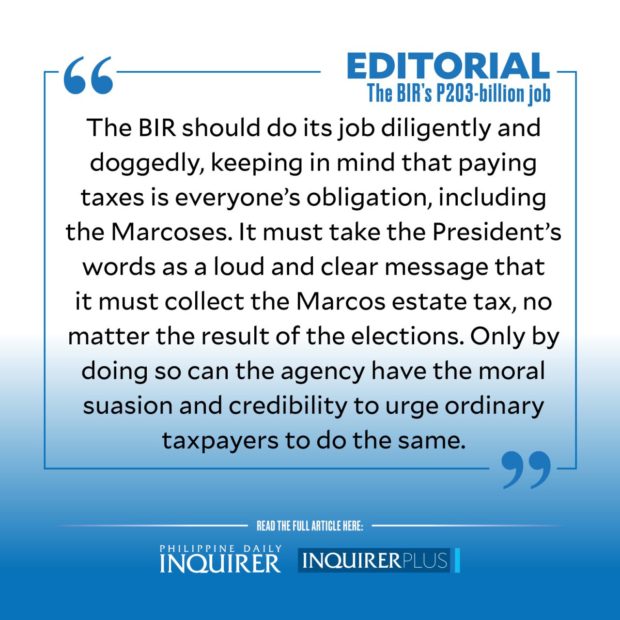The BIR’s P203-billion job
While justifying that he could not shut down the controversial e-sabong because of the P640 million monthly revenue it contributes to government, President Duterte wondered aloud why the Bureau of Internal Revenue (BIR) had yet to collect a certain estate tax.
“Hindi naman kailangan ng reminder sa Malacañang. Nandiyan ang BIR, so tanungin natin ang BIR, bakit hanggang ngayon hindi nakolekta ‘yung estate tax?” Mr. Duterte said last week. Though no name was mentioned, the President was clearly referring to the tax liabilities of the Marcos heirs, an issue that has gained traction in the ongoing election campaign.
In a letter to BIR Commissioner Caesar Dulay last week, the Campaign Against the Return of the Marcoses and Martial Law, a group of martial law survivors, asked for the tax’s “immediate collection,” noting that the money would be good as gone if the Marcos son wins the May elections.
Manila Mayor Isko Moreno Domagoso vowed to collect the estate tax should he win the polls, with his party Aksyon Demokratiko taking the BIR to task. “(But) the BIR did send a written demand to the Marcos heirs on December 02, 2021 regarding their tax liabilities,” Dulay said in a March 14 letter to Aksyon Demokratiko chair Ernest Ramel.
It’s just politics, the Marcos camp responded, asking why the issue was surfaced during this campaign season, as if to undercut Ferdinand “Bongbong’’ Marcos Jr.’s lead in the surveys. Said the candidate’s sister, Sen. Imee Marcos: “… Ang dami dami nang taon, bakit biglang ngayon lumabas, parang talagang paninira yata ito ng bulok na pulitika.”
Not quite the case. Retired Supreme Court Senior Associate Justice Antonio Carpio, in his Inquirer column on Sept. 30, 2021, provided a clear history of the taxes levied on the estate of the deceased dictator and demands for payment religiously made by successive administrations. Wrote Carpio: “Death is certain but not the payment of estate taxes. Ferdinand Marcos died 32 years ago on Sept. 29, 1989. His heirs — Imelda, Bongbong, Imee, and Irene — did not file the estate tax return with the (BIR) as required by law. Neither did they pay any estate tax.’’
Carpio said the BIR computed the estate tax due on the Marcos estate at P23,293,607,638 (or a little over P23 billion) based on the known assets of Ferdinand Marcos at the time of his death as culled from property records, documents recovered by the government in Malacañang when the Marcoses fled the country in 1986, and pleadings filed in court by the Marcos heirs who claimed ownership of foreign bank accounts and other assets of their patriarch. Carpio said any deficiency estate tax earns 20 percent interest per annum until full payment, in addition to a one-time 25-percent penalty for failure to pay within the prescribed period.
On March 9, 1999, the Supreme Court deemed the estate tax due to be final and executory.
How did the P23.29 billion tax balloon to a whopping P203.819 billion? By Carpio’s calculation, “the annual interest payable by the Marcos estate is P4,658,721,527 which, 30 years after the finality of the assessment on Oct. 12, 1991, adds another P139,761,645,828 to the principal estate tax of P23,293,607,638. (Add to that) the 25 percent penalty of P5,823,401,909, on which the 20 percent interest per annum is also imposed (which) now amounts to P34,940,411,454.’’
But why is this issue being raised only now? Per Carpio’s recollection, the Ramos, Arroyo, and Aquino administrations have “faithfully issued” written demands to the Marcos heirs. The BIR, he said, must renew written demands on the tax liabilities every five years, otherwise they prescribe and become uncollectable.
Finance Secretary Carlos Dominguez III confirmed that the Duterte administration had demanded payment of the estate tax. “The (BIR) is collecting and has demanded payment from the Marcos estate administrators,” he said last week. “Bottomline, the Marcoses do not take any steps to settle and pay because of pending litigation,” Dominguez said, referring to ill-gotten wealth still under lengthy court proceedings. He vowed that the BIR will “continue to consolidate the titles in favor of the government on those properties which have been levied upon.’’
Despite general pessimism that the huge tax liability could still be recovered given Marcos’s commanding lead in the surveys, efforts to collect it must transcend partisan “politics” and must be pursued in earnest. The BIR should do its job diligently and doggedly, keeping in mind that paying taxes is everyone’s obligation, including the Marcoses. It must take the President’s words as a loud and clear message that it must collect the Marcos estate tax, no matter the result of the elections. Only by doing so can the agency have the moral suasion and credibility to urge ordinary taxpayers to do the same.





















